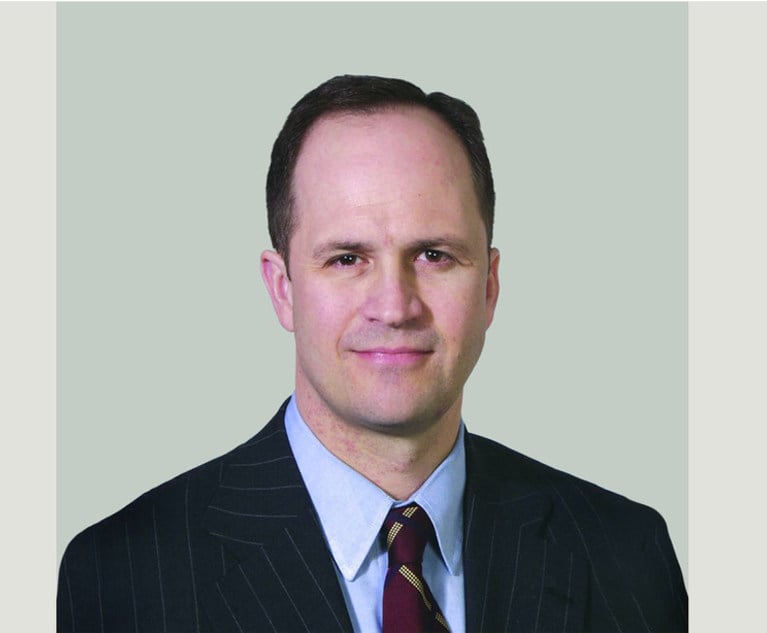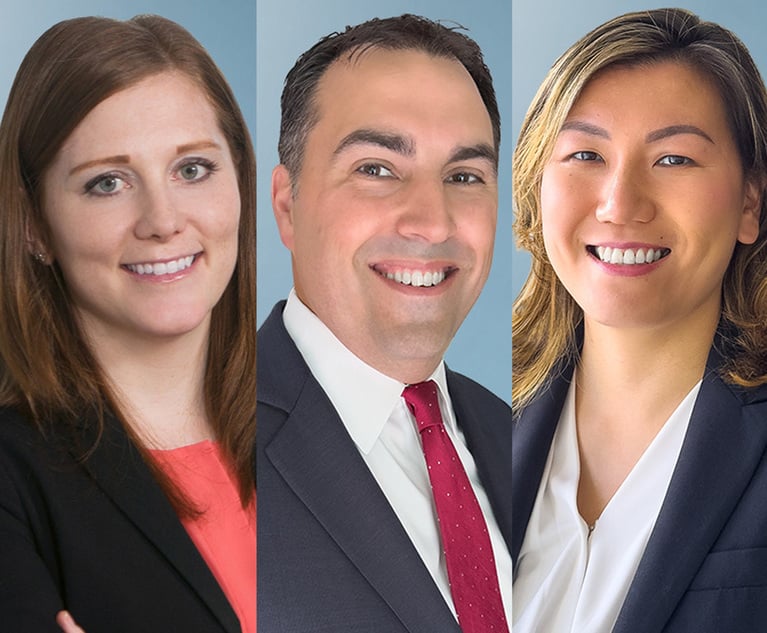 Philadelphia. (Photo: Delmas Lehman – Fotolia)
Philadelphia. (Photo: Delmas Lehman – Fotolia)Phila. Defender Association Argues Attorney Made 'Objectively Unreasonable' Requests for Accommodation of Depression, PTSD
The agency's motion contends that it provided every reasonable accommodation to the attorney, and only fired her after she requested an "open and indefinite" leave of absence.
July 03, 2019 at 03:23 PM
4 minute read
A former public defender, who claimed the Defender Association of Philadelphia failed to accommodate her major depression and post-traumatic stress disorder, made “objectively unreasonable” requests, the association has argued in its motion to dismiss her lawsuit.
The Defender Association on Tuesday filed a motion to dismiss the lawsuit the federal Equal Employment Opportunity Commission brought in the U.S. District Court for the Eastern District of Pennsylvania in late April. The agency's motion contends that it provided every reasonable accommodation to the attorney, and only fired her after she requested an “open and indefinite” leave of absence.
“Because there was no other reasonable accommodation that would allow [Megan] Perez to maintain employment with the Defender Association, Ms. Perez was not a qualified individual with a disability,” the agency said in a brief filed by Littler Mendelson attorney Richard Harris. “Since Ms. Perez could not perform her job without an indefinite leave, she is not a qualified individual under the [Americans with Disabilities Act] and thus fails to establish a prima facie case of discrimination.”
According to the 10-page complaint the EEOC filed on the attorney's behalf, Perez began working for the association as a full-time attorney in 2007, and for the first five years she rotated through most of the units, including handling preliminary hearings, motions court, juvenile, felony waivers and major trials. In 2012, she was promoted to the position of assistant supervisor of the Juvenile Special Cases section, where part of her duties involved defending juveniles charged with sex crimes, the complaint said. She was promoted as supervisor of the section the following year.
In June 2014, Perez was assigned as a sexually violent predator specialist—a position she allegedly told the association she was not comfortable with. According to the complaint, she was told the special assignment would only last two years. However, the complaint said, the assignment lasted about 30 months, and she was subsequently reassigned to the Juvenile Special Cases section, where she again defended juveniles facing sex crime charges.
The complaint said Perez began treating with a licensed clinical social worker in mid-2017, and, on the advice of her therapist, she took a leave of absence under the Family and Medical Leave Act soon after. In August 2017, Perez was diagnosed with major depressive disorder and PTSD, which, the complaint said, “were caused, in part, by her work as an SVP specialist and in the JSCS.”
In September 2017, she requested medical leave until January 2018, as well as a transfer to a unit that does not involve sex-based crimes. The complaint said the supervisors agreed to Perez's return and reassignment. However, two months later, Perez was told by two human resource representatives that she would be fired because she could no longer be covered under the association's malpractice insurance, since she was being placed on long-term disability.
The agency's response, however, contended the memorandum Perez's therapist prepared indicated that Perez's January 2018 return date might not be “feasible,” and that without a definitive return-to-work date, Perez was seeking “indefinite leave.”
“Thus, at the time of her administrative termination effective Dec. 15, 2017 (after 140 days of leave), [Megan] Perez was still unable to return to work in the immediate future with or without a reasonable accommodation—much less perform the essential functions of her job,” the brief said, adding later that “according to the EEOC's own guidelines, providing Ms. Perez with this request would have placed an undue burden on the Defender Association.”
A statement from Chief Defender Keir Bradford-Grey said the organization takes any acts of discrimination “extremely seriously,” and the agency regularly makes accommodations for employees' personal lives, including for health-related issues.
“While we continue to believe this lawsuit is fully without merit, we wish our former employee good health, happiness and success,” Bradford-Grey said.
EEOC attorney Joshua Zugerman declined to comment for the story.
This content has been archived. It is available through our partners, LexisNexis® and Bloomberg Law.
To view this content, please continue to their sites.
Not a Lexis Subscriber?
Subscribe Now
Not a Bloomberg Law Subscriber?
Subscribe Now
NOT FOR REPRINT
© 2024 ALM Global, LLC, All Rights Reserved. Request academic re-use from www.copyright.com. All other uses, submit a request to [email protected]. For more information visit Asset & Logo Licensing.
You Might Like
View All
Rule 126(b) Citations to Unpublished Opinions: Some of Us Still Don’t Get It
6 minute read

Ex-DLA Piper, Ballard Spahr Atty Accused of Aiding Video Game Company Founder's Misappropriation Scheme
5 minute read
Proposed 'Bulk Sensitive Personal Data' Rule and the DOJ’s Comprehensive National Security Regulations
7 minute readTrending Stories
- 1US Magistrate Judge Embry Kidd Confirmed to 11th Circuit
- 2Shaq Signs $11 Million Settlement to Resolve Astrals Investor Claims
- 3McCormick Consolidates Two Tesla Chancery Cases
- 4Amazon, SpaceX Press Constitutional Challenges to NLRB at 5th Circuit
- 5Schools Win Again: Social Media Fails to Strike Public Nuisance Claims
Who Got The Work
Michael G. Bongiorno, Andrew Scott Dulberg and Elizabeth E. Driscoll from Wilmer Cutler Pickering Hale and Dorr have stepped in to represent Symbotic Inc., an A.I.-enabled technology platform that focuses on increasing supply chain efficiency, and other defendants in a pending shareholder derivative lawsuit. The case, filed Oct. 2 in Massachusetts District Court by the Brown Law Firm on behalf of Stephen Austen, accuses certain officers and directors of misleading investors in regard to Symbotic's potential for margin growth by failing to disclose that the company was not equipped to timely deploy its systems or manage expenses through project delays. The case, assigned to U.S. District Judge Nathaniel M. Gorton, is 1:24-cv-12522, Austen v. Cohen et al.
Who Got The Work
Edmund Polubinski and Marie Killmond of Davis Polk & Wardwell have entered appearances for data platform software development company MongoDB and other defendants in a pending shareholder derivative lawsuit. The action, filed Oct. 7 in New York Southern District Court by the Brown Law Firm, accuses the company's directors and/or officers of falsely expressing confidence in the company’s restructuring of its sales incentive plan and downplaying the severity of decreases in its upfront commitments. The case is 1:24-cv-07594, Roy v. Ittycheria et al.
Who Got The Work
Amy O. Bruchs and Kurt F. Ellison of Michael Best & Friedrich have entered appearances for Epic Systems Corp. in a pending employment discrimination lawsuit. The suit was filed Sept. 7 in Wisconsin Western District Court by Levine Eisberner LLC and Siri & Glimstad on behalf of a project manager who claims that he was wrongfully terminated after applying for a religious exemption to the defendant's COVID-19 vaccine mandate. The case, assigned to U.S. Magistrate Judge Anita Marie Boor, is 3:24-cv-00630, Secker, Nathan v. Epic Systems Corporation.
Who Got The Work
David X. Sullivan, Thomas J. Finn and Gregory A. Hall from McCarter & English have entered appearances for Sunrun Installation Services in a pending civil rights lawsuit. The complaint was filed Sept. 4 in Connecticut District Court by attorney Robert M. Berke on behalf of former employee George Edward Steins, who was arrested and charged with employing an unregistered home improvement salesperson. The complaint alleges that had Sunrun informed the Connecticut Department of Consumer Protection that the plaintiff's employment had ended in 2017 and that he no longer held Sunrun's home improvement contractor license, he would not have been hit with charges, which were dismissed in May 2024. The case, assigned to U.S. District Judge Jeffrey A. Meyer, is 3:24-cv-01423, Steins v. Sunrun, Inc. et al.
Who Got The Work
Greenberg Traurig shareholder Joshua L. Raskin has entered an appearance for boohoo.com UK Ltd. in a pending patent infringement lawsuit. The suit, filed Sept. 3 in Texas Eastern District Court by Rozier Hardt McDonough on behalf of Alto Dynamics, asserts five patents related to an online shopping platform. The case, assigned to U.S. District Judge Rodney Gilstrap, is 2:24-cv-00719, Alto Dynamics, LLC v. boohoo.com UK Limited.
Featured Firms
Law Offices of Gary Martin Hays & Associates, P.C.
(470) 294-1674
Law Offices of Mark E. Salomone
(857) 444-6468
Smith & Hassler
(713) 739-1250





